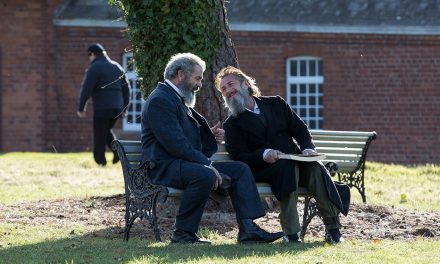Clint Eastwood certainly isn’t shy of a war film. 2006’s impressive Letters from Iwo Jima and its companion piece, Flags of Our Fathers was a fascinating examination of the famous World War 2 battle as told from both sides of the conflict.
Flash forward to 2014 through, and Eastwood has got a bulked-up Bradley Cooper playing the all-American soldier. American Sniper tells the story of Chris Kyle – a somewhat controversial figure famous for killing over 160 Iraqis through four tours. Not known for his tolerance or empathy, and one can only wonder if Eastwood will do for Kyle what Scorsese did for Jordan Belfort in The Wolf of Wall Street.
It’s worth noting that Eastwood is an impeccable filmmaker. American Sniper is incredibly well shot with a palette that emphasises the effectiveness of the US soldier’s camouflage. Unfortunately, after a somewhat paint-by-numbers first act that establishes Kyle’s personality through the cliché-ridden backstory, the long second act loses much of the colour from what is a story that is in no way short of options for dramatic effect.
Still, it’s worth hanging in there for the final act, that takes every device available from the extraordinary setting of Fallujah, and ties up most of the films threads in a pretty neat little package.
The only problem is that we’ve seen it all before.
Certainly, Katherine Bigelow absolutely nailed the separation of US soldiers from their families in the final scene of The Hurt Locker. In American Sniper, Eastwood appears incredibly lazy. The emotional trigger points are obvious to the point of being cringe-worthy and feel harder to watch than any of the simulated violence. Sienna Miller, who could have phoned in her role as the suffering wife-at-home, does the best she can with a paint-by numbers caricature that looks intended to be so universal that she is utterly uninteresting.
Perhaps the issue is a cultural one. Sniper isn’t made for Australian audiences. It’s a film directed by an arch-conservative from a country that reveres its military rather than simply respecting them. Eastwood spends absolutely no time critiquing a man who referred to Iraqis as ‘savages’ (despite the 3,000 year history of their culture) and was regarded as a hero for his efforts. No, the preference here is to let him roam through the entire two hours indulging his prejudices unquestioned.
South of the Mason-Dixon line, American Sniper might resonate as the story of a hero that did his best to protect his country. For everyone else, this will be a film where Eastwood has inadvertently highlighted the danger of patriotism and the ‘you’re-either-with-us-or-against-us’ mentality.
Despite the films flaws (and there are many) it’s this fact alone that makes American Sniper worth watching.





